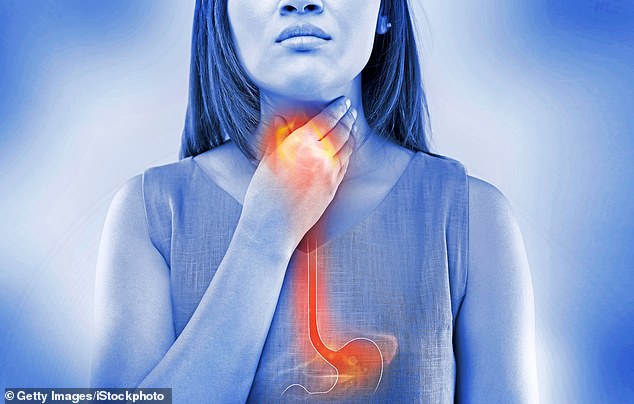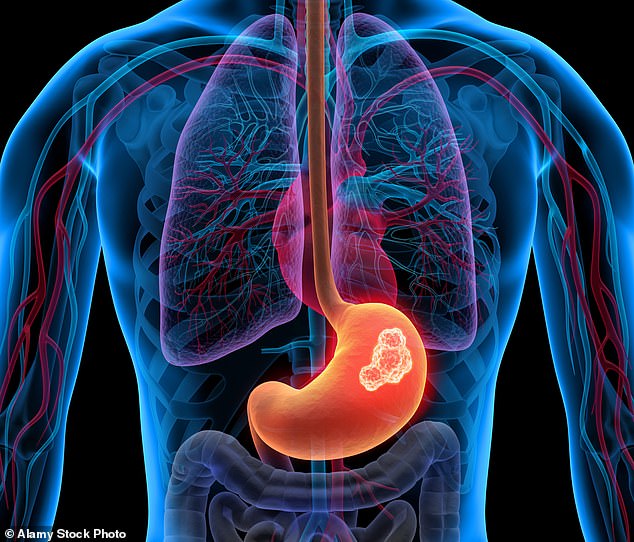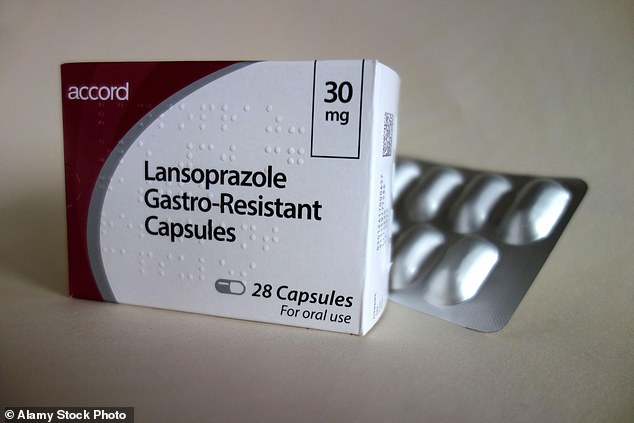A top GP has warned of the serious risks of ignoring a common ailment suffered by millions of people in the UK – and revealed when to seek medical help.
Indigestion, which can cause heartburn and acid reflux, plagues more than 40 per cent of Britons every year.
The condition usually involves pain or burning in the upper abdomen or chest, and can be triggered by food, drink and some medications.
In most cases, symptoms go away on their own after a couple of hours.
But persistent heartburn that worsens or continues over a long period could be a sign of something more sinister, says Bristol-based GP and senior lecturer at the University of Bristol, Dr Dan Baumgardt.
'Indigestion is common but not always harmless,' said Dr Baumgardt, in a recent piece for The Conversation.
'Over-the-counter treatments can provide relief and many benign conditions often prove to be the underlying cause.
'But in some cases, persistent symptoms may signal a more serious underlying condition, including cancer.'

Both heartburn and acid reflux can be common symptoms of indigestion.
Heartburn can feel like a burning sensation in the chest, while acid reflux involves the physical process of stomach acid flowing back into the oesophagus.
Certain benign physiological conditions can make people more prone to both forms of discomfort.
A hiatus hernia – where part of the stomach pushes through the diaphragm and into the chest – can make acid reflux more likely, and is experienced by a third of all over-50s.
Frequent consumption of coffee, spicy or fatty foods and alcohol, as well as being obese, pregnant or a smoker can also make someone more likely to get indigestion.
And some medications, such as antidepressants, ibuprofen, anti-inflammatories and iron tablets can trigger symptoms as well.
But frequent and persistent indigestion without any of these explanations, or heartburn that has changed in severity, could indicate a more sinister cause.
'After a rich or spicy meal or a stomach bug, some indigestion is expected – and might last a few days,' said Dr Baumgardt.

'However, persistent dyspepsia can sometimes be linked to more serious conditions.'
And it's not just cancer. Indigestion caused by inflammation to the oesophagus, stomach or duodenum can have many causes, including infection with a common bacteria that can live in the stomach lining and is a leading cause of ulcers, said Dr Baumgardt.
'Antibiotics and omeprazole may be required to treat it. In some cases, this infection can progress to a peptic ulcer, which carries serious risks of bleeding or perforation of the gut,' he added.
Some heart conditions – such as ischaemic heart disease, which causes a narrowing of the heart's blood vessels that can restrict blood flow and cause chest pain – can also present like indigestion.
And more worryingly, chronic indigestion can be a sign of some upper gastrointestinal cancers as well.
Symptoms of these types of cancers tend to include persistent difficulty swallowing, unexplained weight loss, upper abdominal pain or discomfort, and feeling full after eating a small amount of food.
In very severe cases, patients may also start vomiting blood, which requires immediate hospitalisation.
To rule out cancer, doctors will likely provide an endoscopy – whereby a flexible camera is inserted through the throat to examine the upper gut.
Cancers of the pancreas and ovaries – both notoriously difficult to find in their early stages – can also sometimes cause indigestion amongst other symptoms.
'This is why it's important not to self-diagnose, and seek medical advice so a doctor can put the pieces together and make an appropriate plan of action,' said Dr Baumgardt.
The warning comes just a month after a top pharmacist warned that a medication taken by millions of Britons to relieve heartburn and acid reflux could have a harmful impact on digestion in the long term.
Deborah Grayson, dubbed the 'Godmother of Pharmacology', took to TikTok in August to discuss how omeprazole – a proton pump inhibitor (PPI) – can affect gut health.

In the video, which has had more than 42,000 views, Mrs Grayson said that while the drugs may offer sufferers momentary relief, they could also cause problems – leading to bloating and nausea, weight gain and vitamin deficiencies.
PPIs are one of the UK's most prescribed mediations in the UK, with 73million NHS prescriptions dispensed in England in 2022-23, at a cost of £190million.
She explained: 'Omeprazole stops heartburn and reflux, but how does it really work? It's a PPI, and that interferes with the cells of the stomach responsible for producing stomach acid.
'So, if we stop the stomach from producing acid – by taking a PPI – the theory is that we will stop the acid coming back into the oesophagus and causing heartburn and reflux.
'There's often a discussion about whether heartburn is related to low or high stomach acid. But actually it's to do with the timing of the stomach acid.
'While stopping your stomach producing that acid can be beneficial in the short term, it's not always great for your digestion in the longer term as we need that acid to break down our food.
'It can be helpful to have omeprazole if you've got gastritis or erosion in your oesophagus, but if you've only got simple heartburn-related problems, longer term it can have greater impacts on the body.'
Read more- Is heartburn treatment with PPIs causing more harm than good, potentially leading to serious health risks like cancer or mental health issues?
- Could ignoring heartburn or indigestion symptoms be a deadly oversight potentially leading to killer cancers like oesophageal or stomach?
- Could the over-prescription of heartburn drugs be fueling a hidden dementia risk for millions of Brits?
- Is your heartburn medication secretly putting you at risk of dementia? Discover the uncomfortable truth about long-term PPI use backed by recent studies!
- Could your daily heartburn pills be secretly fuelling depression and cancer risks without you knowing?
Post a Comment for "Heartburn warning: Top GP reveals red-flag symptoms that could signal something sinister"